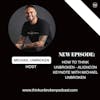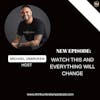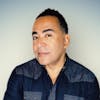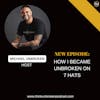Best Mental Health Tips For 2024
Experts share their best mental health tips for 2024 - how to heal trauma, cope with grief, overcome stagnation through reframing narratives, laughter, patience and courage to change. A roadmap to empowerment... See show notes at: https://www.thinkunbrokenpodcast.com/best-mental-health-tips-for-2024/#show-notes
Discover the best mental health tips and strategies for 2024 in this powerful podcast episode. We dive into practical advice from therapists and advocates on healing trauma, coping with grief, overcoming stagnation, and more.
Learn to reframe painful narratives, introduce laughter amidst loss, move forward after hardship, and show compassion towards yourself. Our exceptional guests share their expertise on patience as an essential skill, the courage required to change, and how connection can profoundly restore wellbeing.
By taking meaningful action - whether journaling, joining a support group, or trying therapy - you can find light even in the darkest of times. Implement these wise tips and mindfully transition into your best self this coming year and beyond. This episode provides a roadmap to empowerment for all seeking mental health in 2024.
************* LINKS & RESOURCES *************
Learn how to heal and overcome childhood trauma, narcissistic abuse, ptsd, cptsd, higher ACE scores, anxiety, depression, and mental health issues and illness. Learn tools that therapists, trauma coaches, mindset leaders, neuroscientists, and researchers use to help people heal and recover from mental health problems. Discover real and practical advice and guidance for how to understand and overcome childhood trauma, abuse, and narc abuse mental trauma. Heal your body and mind, stop limiting beliefs, end self-sabotage, and become the HERO of your own story.
Join our FREE COMMUNITY as a member of the Unbroken Nation: https://www.thinkunbrokenacademy.com/share/AEGok414shubQSzq?utm_source=manual
Download the first three chapters of the Award-Winning Book Think Unbroken: Understanding and Overcoming Childhood Trauma: https://book.thinkunbroken.com/
Join the Think Unbroken Trauma Transformation Course: https://coaching.thinkunbroken.com/
@Michael Unbroken: https://www.instagram.com/michaelunbroken/
Follow us on TikTok: https://www.tiktok.com/@michaelunbroken
Learn more at https://www.thinkunbrokenpodcast.com
Our Sponsors:
* Check out Factor 75 and use my code unbroken50 for a great deal: https://www.factor75.com/
Support this podcast at — https://redcircle.com/think-unbroken-with-michael-unbroken-childhood-trauma-cptsd-and/exclusive-content
Advertising Inquiries: https://redcircle.com/brands
Privacy & Opt-Out: https://redcircle.com/privacy
Support the Podcast: Become a listed sponsor!
Follow me on Instagram @MichaelUnbroken
Learn more about coaching at https://coaching.thinkunbroken.com
Get your FREE copy of my #1 Best-Selling Book Think Unbroken: https://book.thinkunbroken.com/
Navigating Trauma and Mental Health with Lori Gottlieb, a Psychotherapist's Perspective
Michael: How does love heal you?
Lori: I think that love shows us that we can connect with another human being and just by being ourselves and that we are enough, that we are inherently lovable, that we are flawed, that we have moments of, we have heroic moments, we have our, not our finest moments, all of it, the whole spectrum of who we are, of our whole humanity, and we are still inherently lovable, that is so healing, that makes you walk through the world so differently than worrying about, am I lovable? Am I worthy? You know, all of those things, just knowing that you are lovable and people say, oh, you have to love yourself first. And I always sort of have trouble with that because what I see is that it's both that you have to show up as somebody who believes that you're lovable, but you also need to see it in practice in the world. Both of those things I think need to happen.
Michael: Yeah, there's definitely a parallel tract, right? And as you're going through, it's interesting me ‘cuz it's like a mirror and I've been thinking about this a lot lately. Like you bring into the world what you are and if you are hate and despair, you will find hate and despair. If you are love and peace, you'll find love and peace. And I'm with you, I do think that it is a parallel track, but I think that at the beginning of it, and this is also I'll just speak from first person, as I discovered at 27 years old, that I had never loved myself. We're talking 12 years ago now because of the implications of all the abuse that I went through, because of all the experiences of my life. The singular hardest thing that I had to do was recognize that you have to build love in yourself, and I think that a lot of people find that feels insurmountable, that to your point, they feel unworthy, they feel unlovable, they feel like they don't matter in the world. What are some things that people can start doing? What are things even that for yourself in your personal life that you've done to love yourself and that maybe other people can take into consideration?
Lori: I keep thinking about you as the 27-year-old because you know, we have this saying, tell me how you were loved or show me how you loved now, and I can tell you how you were loved as a child.
Michael: Absolutely.
Lori: And I think we see that we know not just as a therapist, but you can see that with your partners, right? Like when you meet someone and you say, oh wow, they really interpreted that comment that way. Oh, this is historical, you know, we always say if it's hysterical, it's historical, meaning that if you're having a reaction that feels bigger than what's happening right now in the present in the room, there are probably some ghosts in the room, there are probably some people in the room from your past that are sitting in the room with you that made you go from zero to 60 really fast. And so, it's really important when we talk about loving ourselves, that we understand the way that we were loved as children is not necessarily an accurate view of how lovable we are, that the way we were loved as children is more about the person who loved us that way and couldn't love us in a certain way. It was more about them than it was about us. So, we believe the story, we all have stories that, that carry us through our lives. And what I do as a therapist is I feel like, and you know, I have a writing background too, so I feel like what I do is I work as an editor and I help people to edit the faulty narratives that they're carrying around about themselves. I'm not lovable. I can't trust anyone. Nothing will ever work out for me, whatever those stories are. Or sometimes people have these stories that they use to cope when they were younger like, I'm better than everyone else which is also not true. So that's not self-love, that's narcissism. So where did we get these stories? And we have to understand that if you had a really critical parent, it wasn't because something was wrong with you, it was because something was wrong with them and something was wrong with their parent. This is the generational trauma that we talk about, and the person who finally comes to therapy and says, I don't want to not only treat myself this way, but I don't wanna pass this down, even if you don't have your own children, like I don't wanna pass this down to, you know, whoever I'm in contact with. This is not okay. Something is wrong with this story. Not something is wrong with me. Something is wrong with the story that I was told. I was told a faulty narrative and I believed it because I was a child and I didn't know any better. But now I can really look at this critically and say, wait, how true is this? And am I doing something to perpetuate this story? Am I choosing people who are going to like, keep that story going? Right? Do I choose critical people, angry people, damaged people and damaged I don't mean that in a pejorative way. I mean, people who haven't done the work to kind of see what story are they carrying around and what are they inflicting on other people. So, I think that the first thing we can do is to examine our stories. You know, where did I get this message that I'm not lovable, that something's wrong with me, that I'm defective, that I'm not normal, whatever that means. Every single one of us is quote unquote normal, we're just human. But what are these maladaptive ways of being in relationship that kind of perpetuate the story where we choose people who are going to hurt us in exactly the same way, that we were hurt when we were younger. I always say that, you know that that's called repetition compulsion. But I always say that we do that where we say I'm gonna find someone who's going to treat me differently from the person who hurt me when I was younger. And then we go out in the world and we find these people who are like really good partners first, potentially. But we go on a first date or a second date, we're like, yeah, no chemistry because we're not used to being treated well. So, our unconscious is, yeah, I don't recognize that, that's not familiar. So, our unconscious is looking for quote unquote home. Home is the familiar of what we did when what we had when we were younger. And so instead, then we go and we go out on this date, or we meet someone somewhere, we say, oh, that person, Hey, you look familiar. Come closer. And what's familiar about them is that unconscious. Oh, they're gonna hurt me, but we don't know that in that moment. So, then we get into relationship with them and we're like, wow, I didn't realize that they were like addicted to this thing. Right? Or I didn't realize that they have anger issues, I didn't realize that they can be really kind of passive, aggressively insulting, or they're very jealous of my success. Right. They try to shut down my joy. Oh, I that feels really familiar. And then like, you know, all men are like that, all women are like that, you know, all women are crazy, all men are controlling. And it's like, no, no, no, no, no you're choosing people who are like that person who raised you with that model. So, we have to do the work, that's where the work comes in therapy is, you know, and then maybe you should talk to someone in my book, there's a woman just like that, and she has this idea that the problem is out there the problem is with other people and it's not about who she's choosing. And we come to realize, hey, it is about who you're choosing and wow, when you start really repairing your relationship with yourself and setting boundaries with your parents and understanding more about what was them and what was you. Now, when you go on that date with someone who's healthy, you're like, oh, I'm interested in that person.
Mental Health Advocate Jake Shannon on Living a 10x Life and the Importance of Self-Care
Michael: And look at the way that you present yourself into the world as the person that you are and have a willingness to look in that mirror, man, because that was the pivotal changing point for me too. And look, I don't wanna be fucking preachy cuz people have heard this before, but it's like, listen to this show, pay attention to people's stories like yours, Jake, because we all have something in common. We all had to get the fuck out of our own way.
Jake: A hundred percent, dude. But so, here's the other angle to that though, right? The thing that took me a while to earn as well. So, I do think wrestling is probably for me is, and grappling and martial arts, the greatest personal development tool that I ever really got involved with in the first place, right?
So, this is what I call the five pillars of greatness. I don't know, I'm listening too much to this personal development shit, so I'm coming up with my own. So, the first is like that get real that rock bottom, that man in the mirror moment. The second is getting obsessed. The third is taking calculated risks, right? Which I think hopefully we've talked about all these. The next one is that massive fucking action. And the thing that I was missing out the most that I have recently come to, and maybe it's as I approach 50 in my testosterone decreases, or I don't know what the hell or, because I got so many damn injuries, I can't really do what I used to do, but people is the fifth pillar and I had ignored it for a long time because I wanted to do everything myself, because exactly what you said, people let me down all the time, nobody worked as hard as me. Didn't do it the way I did it to my standards. And I did a lot of great stuff with those first four pillars. I did a lot of fucking cool stuff like I said, I started the mace, the whole fitness mace movement, which still blows my mind to the stand. I'm like, I still have to be like, oh, that was me shit.
Michael: Dude, I saw some video on YouTube, or I might have been TikTok a reel, whatever these things are the other day and I meant to send it to you and I was like, in passing and it had like 500,000 views and it was, or maybe you posted it, it was a girl with a mace just like doing this mace work. I was like, I know the guy who made that.
Jake: Yeah. I mean, it's ridiculous, right? Like, I'm like, I still am like wow. So, I was having massive impact, but I mean, I want like really massive. I want legacy, dude. I wanna die and have my like immortality. I don't want physical immortality. I want my shit to live on for like generations. Right? Like that's what I want, that's crazy.
Michael: But your shit is impact.
Jake: Yeah dude. So, that's gonna take people and that is that fifth pillar is you have to really learn to be a leader. And here's the irony. So going back on my story to when I was in college and I ended up going to college. So, when I got sick, I think I was a sophomore, it was between sophomore and junior year. I got sick and I just was like, fuck, I can't be physical right now. So, I doubled down on academics and I did great. Okay. Because I didn't have anything else to do, right? I ended up going to the University of Colorado on a scholarship, first person in my family to go to college, first person to get a scholarship like awesome, okay. I go on a prestigious leadership scholarship, right? I think it's like 50 out of the 10,000 incoming freshmen get chosen to be in this program. And I'm in this leadership program and I'm a loser dude. I'm like doing drugs. I'm like, pick the easy way out and I get in this leadership, and here my buddy, who's just this scrappy little skateboarding kid is getting mobilizing all these people to build skate parks and do all this stuff. Right. And that was the real lesson for me. Is if I wanna have big impact, like Thrasher level impact, right? Jake Phelps, the guy who ran it, who my friend took over from like that guy blew that shit up, it's live past his life, right? Like that's where I'm wanting to go with scientific wrestling and all this crazy shit that I do.
So, I think I might have done that with the mace, but the mace was just kind of a side project that was like luck in a way. I mean I did it and it was designed, but also it wasn't my intention. I was aiming over here and I hit over here, right? So, I'm like, okay, I need to do this with the wrestling thing and that's gonna take people. So, that is where the leadership component comes in. I do think that you have, I've started now in the last probably five or six years really taking that serious, like how do I get people to actually get into what I'm doing and how do I create a mutually a positive sum game? What Grant Cardone calls the Winners Exchange? Okay, that's awesome. But it's just a simple idea of win-win. How do I align people's interests with my interest? Like with what I wanna do? So that's really where I've gone in the business of this.
To me business is an ethical system, it's a moral system, right? Because I look at like human interaction. I like your unbroken shirt and I can either trick you or and steal it from you somehow, or coconut on the head and take it. Or I can give you 20 bucks and if the shirt is worth less than the 20 bucks, I have you give it me your shirt's worth more than the 20 bucks and we're both a win-win, we're both happy for the exchange, that is where I've been spending the last five or six years, almost entirely in business. So outside of the wrestling; the wrestling's, like my obsession, the wrestling is what has educated me, what has fulfilled me and is my life purpose. But just like I said, I'm aiming for that and I hid elsewhere like I've started all these other companies and like I started the first reverse mortgage consultancy. I sold my shares out cuz I was like, well I need to buy a house, so I'm gonna just buy this house, I don't even wanna do the work. But these guys, that company now is like a, I think they pull something like he was telling me it's like eight or 9 million dollars a year. Right. And that was totally just me having one of those moments and this guy was my boss and he kept bugging me every day. He was like, dude, I need market share numbers and these are all privately held companies, I'm like, dude, unless you gimme like a corporate espionage budget, I can't get, these are not in 10Ks. I can't go fucking look this up. And he was just kept bugging me about it. And one day I was like, we had a weekly Friday meeting, and on that, I remember this Friday, I came in and I go, I solved the problem. I got the problem solved and he's like, what? I go, yeah. And he's like, whoa, okay. What do we gotta do? Okay. I said, well, I need to quit, you need to quit and we need to take this database guy with us. He's like, what, dude? I'm like, no, just hear me out. What we're gonna do is we're gonna quit and then we're gonna get NDAs for everybody in the business to give us their data, and we're gonna spit back reports with only their data as a slice of the pie, everybody else grayed out, but you know, company A has got this market share, company B's got this and you're here. And he was like, all right, let's go, that was 2006. That was the last day I worked, by the way, for somebody else.
Laughing Through Grief_ Navigating Loss with Chelsea London Lloyd
Michael: One of the things that I really love about the aspect that you taken changing the conversation about this is stepping into it with laughter, and I did that comedy, in whatever context it is, is allowed to exist within this dark space. Where does that come from for you? What is it that you were just one day? Like, you know what? Actually maybe this could be funny and some weird-ass way, right?
Chelsea: Right. Well, thank you for saying all of that. You know, I think it went back to the time of being in elementary school with like a paralyzed dad and a mom with a bald head like it's not funny, but it is like they just physically looked so different than other people's parents, you know, you have to start laughing at some point, I think I started laughing around then of course, I was very affected and it's not funny all the time but I think a realizing the young age like this is already bizarre and comedic if you choose to see it that way, be using laughter was a way that I felt I could make adults feel comfortable. I think that a lot of people looked at me like; hahaha, how are you feeling? How Is it going? But, you know, people don't know what to say to young kids in this situation. So if I were to make a joke, if I were to infuse humor into the situation, then we felt, okay, and I learned that pretty early on. I was also acting at a young age and doing musical theater at the time, three or four shows a year, and I was drawn to the comedic shows the comedic roles. I think also, because of my parents and their medical appointments, that was kind of like my daycare, my thing. So, finding my people there, as well as along with just realizing that I have to tell jokes to make people feel, okay, which as a lot of comedians do self-deprecation, can be to a fault, you want to make sure you're processing, your emotions in a safe way, at some point, besides just putting yourself down, like, I always say, my stand-up and my sessions in therapy or the exact same thing through a different lens. I'm processing the exact same things but in stand up, I'm making fun of it and then therapy I'm exploring it. So I think we all have those two sides to ourselves and also for anyone who doesn't necessarily feel like they're resonating right now with the community lens on grief. I feel you and I always say that comedy is tragedy plus time, that's a quote, I didn't come up with it, but it's true.
You know, the weekday month after someone dies. There's not a lot of room room for humor and yet depending on your situation, you might find yourself in a family who does crack jokes about it, or if you don't, you might wish that you had.
So I hear a lot of good stories in my counseling, and my podcast work about like, well, actually the funeral was really funny because this like they sent the wrong casket, they did this, my grandma slipped me, a $50 bill, my uncle was high during his speech, whatever. Things that are either a hilarious or be so uncomfortable bizarre or comedic that you just have to laugh out of sheer will. So I was exploring all of that through childhood, and then again, when my mom's terminal diagnosis came and terminal it's a word, I don't like to throw out there out of fear, or to be alarming, but for lack of better words, you know, she received her diagnosis as to stage 4 breast cancer. She had first, had it 17 years earlier, when we were kind of laughing out of disbelief were like, why is this happening again? And also I was a little bit older, right? So I just thought this is so painful. What can I do to make it less painful? And that was making jokes about it, with my friends, to myself, in my stand up, and through that I've actually seen a shift in my mom who was a lot more serious, I think over the years, has kind of opened up and she'll even make light of her own situation and mortality time to time, which, of course, is not for everyone. It's not about putting yourself in a position, you don't want to be, but it's about choosing that, see things a different way. So that was the road that I took.
Michael: Yeah, I love that and I love what you said about, look at may not be for you, right? I often in my own life, have attributed a ton of humor, too. Some of the darkest experiences of abuse that I've ever been a part of, and sometimes, my people are like; Yow! Dude, that's like over the line.’ And I'm like, but it's my life, I can say what I want about it. And you're absolutely spot-on. I don't know that it's necessarily for everyone, but laughter is medicine as they say. And I think that you can take that and you can take ownership over and it can help you.
In my experience, really be able to process things in a way because I feel like without jokes to a lot of the darkness, and without the challenges of my own life of putting myself on stages and learning how to be a public speaker through comedy, I don't know if I could be talking to you right now, you know what I mean? And so I think there's a lot of power in that, when you're in this and you're like, okay, well maybe something about this is alluring to me in some capacity.
How do you kind of figure out the best way to handle grief in your life? Because while some people will hear this and go. Yeah, okay. So I can entertain the idea of this comedy thing. Other people are like; this is the worst thing that's ever happened on the planet fucking Earth. So how do you kind of like start to navigate the approach of working through this?
Chelsea: Right. Right. And let me be clear. I too think it is the worst thing on planet Earth and it is never to take away from that, and hopefully by even listening to what I'm saying now, like it's clear that I you know, it's a very serious thing and even my podcast episodes’ people don't what to expect and some are really funny and I had comedians on and we're shooting the shit and some people are sobbing hysterically, like not all the episodes are funny. It's just that in every interview, I had minimum ask them about a comedic element of their journey or things like asking their person's name and it's just kind of to show, it's a lens to show people that like, hey, this is a safe space for you, this isn't like an ancient, were a 50-plus grief group, and we're talking to angels and finding meaning through rainbows or Bibles and there's nothing wrong with that and there are powerful elements that as well, but I think it's also just a way for people to be like when they're searching through grief things, and then they come across my stuff like; Oh! that's different, or oh! Like I am from a funnier family. So this resonate, so that's kind of just the way that the dots are connected there. In terms of advice for processing grief yourself. Again, comedy equals tragedy plus time, so it is very possible. You don't find things funny right away, some recommendations, I would of our the dinner party is a virtual grief group that used to be in person and perhaps we'll come back and person, I leave virtual grief groups through there and there's plenty of tables that you can join and people in their 20s, through 40s who are exploring grief and there's table specific to parent, specific to siblings, specific to friends, specific to buy POC, individuals, and what have you my mind is exploring humor, excuse me, - exploring grief through humor. So there are things like that, but I would say find an individual that you can talk to about your experience, and if you don't have one, there's things like these virtual grief groups, which I always think even if you do have a best friend or family member that you feel comfortable talking to, there's something really powerful and badass, but opening up to a group of strangers, but what you're going through and just, you know, they don't know you, so there's not that inherent judgment or thought process.
So, finding a group like that, the dinner party is completely free, there's also a buddy system on there. So if you do prefer one on one, they can match you with someone who lost someone in a similar way to your own. I also recommend virtual therapy, I've been in Virtual therapy for a year, or of course in-person therapy is lovely too. I use the platform better help, there are many out there and they're popular for a reason, they're also more affordable. And if you are bedridden or disabled in some way, like my dad was then there's possibilities for you to access therapy from your own home, which is really beautiful as well.
I would also say just start to explore how you're feeling now, and yet marking your calendar. I mean, it sounds bizarre, but it's common to push your grief aside and figure riding the momentum of life is something that we do. Like in college, I just rode the momentum of the busyness and craziness of college. I don't feel that I really started processing my grave till about 5 years later and even marking your calendar with something as bizarre as like, check in with self, check in with feelings, check in with grave, whatever you want to call it. You can also just put on your calendar butterfly and not tell anyone what you're doing and really take an hour, a month, hour a week, whatever you can do and say, how am I really feeling about this? I'm a fan of the be right journal. I resisted this for years, people say this but it's true. Writing everything down, literally, as much as you can, setting a timer, they say for 10-15 minutes and just going for it. I feel bizarre. I feel crazy. I don't know how I feel. I feel sad, I missed my person. I know to say this exercise is fucking stupid, someone told me to do it, like you just have to get what you're you have to get it out, you know, and some people use exercise, some people use journaling, some people use like venting on the phone to their friend or whatever, whatever your thing is for you, you got to get it out because it will be trapped inside of you and it and it will come out years later. So, the dinner party journaling, there's a book called Modern Loss can have conversations about grief, beginners welcome, I think that's a good beginning guide to exploring grief.
You can also my podcast has a lot of episodes of young people grieving. So if you just want to listen to other people's stories as a way to process your own, that's why I love podcasts. I know you love podcast; you have a podcast. You can learn so much about yourself from being into someone else without having to cross the awkward barrier of like; ‘Hey! I'm so, and so and my mom died, and I saw your mom died.’ So like, let's chat. It's just like you can listen to this person, talk about their grief and learn what you know, hear what they have to say and you can you can benefit tremendously from that way as well.
Finding Joy and Purpose Through Patience and Trauma Healing | with Tamara Fox
Michael: I think that people are often in transition and that's the place in which they get stuck. How do you not be stuck in the transition?
Tamara: It's, I think so, are you saying when they're going from like the triggering event or whatever, that may be the moment exactly to where they're at, getting to where they want to be or their, that desired state
Michael: Almost. Yeah, exactly right?
Tamara: Yes. Often what I've seen is you experience, like a huge hurdle kind of in between, like in that transition phase, you almost have to climb up a mountain in many ways, metaphorically, to get to that place. And it doesn't seem like it should be more difficult before it becomes, before you get to where you're at and it takes work. Like you have to be willing to do the work of what you're saying, sit in that uncomfortability, sit in that period of, I'm not where I'm at yet, but I know I can be where I want to be. I just have to allow myself time and patience. Many people from my experience tend to get stuck in it because either one, they give up and they're like, this is too hard. I don't want to do this, and then I work with them and I'm like, okay, we're going to do this. We're going to get through it. But a lot of people will give up on their own because they don't want to do the uncomfortable work, they don't want to do what's hard. They don't want to do something that makes them feel vulnerable or like they're doing something they shouldn't be or two, they become impatient. They're like, I should already be done with this by now. And I know for me personally, the impatience piece resonates so much because I so many times, especially in my early 20s I wish they would teach you in school. Your 20s just are hard, nobody, I know you hear that from your parents, you hear that from your parents, but I really wish there was like a guest lecturer that would come in freshman year of college or senior year of college and be like, listen, you're about to go into the real world and it's going to be great, but your 20s fucking suck, period, they are hard, and that I think for me was the hardest part because I'm obviously just now 32, I was so impatient in my 20s and I was like, I should have been married, I should have kids. I should have this. I should have that. I should be, my PTSD should be gone. I shouldn't have anxiety anymore. I should have this job and this career. And I just assumed I should have all of this by 26, that American dream or things I was told to have, and instead my 20s were just hard. So it's that patience piece of, I wish I would have given myself more grace. Giving myself more acceptance for it's going to come allow it to come be okay with this uncomfortability this growth be happy and that sounds so cheesy because there was nothing for me to be happy about them, but there was still so much I could be happy and grateful for in that time. And I think, I focused so much personally on what I didn't have instead of what I did, what I lacked instead of what I already had within. And I also focused so much on that external world instead of myself. So I, so go back to your question on, why do people get stuck? It's one, they're focusing on everything else around them, lack of patience or they just don't want to do the hard work. They don't want to get through it. People often give up. I know I've talked with my coach about this. She's a psychotherapist turned coach. So I always say she's great for me because she's a coach, but if I need the therapy support, she knows it, and she always tells me, she's like people. Don't want to do the hard work, she's you have when I'm working with her and I'm frustrated about things. She's you have to give yourself so much credit because so many people aren't doing this more. People are choosing to not do the hard things to stay where they're at than to do the hard things and get past where they're at.
Michael: And I will acknowledge that (A) yes, and (B), it's if you are listening to this podcast still, six years, all of these episodes, you're sitting here with us, right? You're doing the work, this is a part of it, even though it doesn't seem like it, you're like planting these seeds, like the showing up and the participation of just I always think about this, the people who go leave a review for this podcast, it's like, those people are going to heal, like I'm writing that on you, I'm giving you that energy, right? That's me being facetious, but really if I look at the journey, there's. One, I post shit like this all the time, I fully believe this you will not lose if you don't quit but the patience element of it is probably more important than anything, and patience is not a virtue. And whatever philosopher said that should have been hung in the town square because it is a fucking skill, patience is a skill. And like you in my 20s and growing up in the Midwest and being in Indiana at the time, all my friends were married. Most of them were having children, most of them were in their career, what's really interesting? I look back at some of those people and this is not me negating their journey or anything to that capacity, but they're still doing the same shit like their lives are not dead and it's like that's your thing, right? But if you're chasing something different you have to be incredibly patient and more so One of the things that I sit with quite frequently in my own journey, it's like I look at the amount of money, the amount of time, the amount of energy and effort and travel and plane rides and hotel rooms and tabs and conversations and coaching sessions and therapies that I personally have had. And it's I still got PTSD. I still have trauma, I still have things that I'm working through and that is the game and. It's about being willing to continue to play the game knowing that it's an infinite game that in a year you will be different, the problems are still going to be the same problem. Which I think is really fascinating. But you have, you'll be more better equipped to navigate them as long as you're giving yourself the space to go down it, because I think people see folks like us who are coaches or leaders and they go, they have it all together, and I'm like, no, I don't, I don't, I may be more than you, because that's the process, like I'm a step in front of you, you listen to me, my coach is a step in front of me, I listen to him. And that's the game, how do you, now, not being in your 20s and having a different career and building this life, but still doing the work and acknowledging all these things what is, what does grace actually look like in your life? ‘Cause that's a word again, like healing people throw around and it's a buzzword is the digital grace. Namaste, what the fuck ever. But like, how do you really bring that into your life?
Tamara: Yeah, I want to go back to something you said, though, about not giving up because I think that's the biggest thing and that's something I talk about a lot when it comes to like resilience and just because for me, I wanted to give up so many times. I know I said of this earlier, but like the traumatic event happened when I was 19 and then from 25 to 30, it felt like everybody was dying or and it was continual deaths over and I wanted to give up every single year. So I think we're just acknowledging that it's okay to want to give up, but to make the choice that you don't give up, because I wanted to give up, but I chose not to give up and I wanted to do it so many times, but I didn't. So I think I just wanted to go back to that just to let you know, for those that are still listening now, like it's okay if you want to give up as long as you choose not to, and then to go to your next question of, now being in my thirties, how am I doing life differently? Now that I'm at the place I'm at, then I am in my twenties. I can only do what I do now because I handled my shit. And when I say handle my shit, I healed that really intense trauma so that yes, my trauma is still there, my PTSD is we live with that for the rest of our lives. I'll live with my traumas for the rest of my life. I will no longer have the people in my life who have passed physically present for the rest of my life. But okay, healed the stuff that enabled me to talk about in a way in which is empowering and confident instead of trauma dumping. And that's what I encourage others to do is, you can be the person you want to be, or like you or anyone else that they, someone that may admire, but you have to handle your shit. You have to heal through what you need to, because if you don't, you can't grow, and the reason I can do what I do now and be a coach and work with others is because I healed that I couldn't be a coach when I was 22, 23, because I was so much still in my healing of my own shit, but because I always say too that what happened to me when I was 19 basically set me up for the deaths that occurred from 2016 to 2022. It set me up to handle those in a different way. Whereas if my first traumatic experience was my grandma's death in 2016, I probably couldn't do the work that I did until much later in life, but because I had something happen at such a young age, healed through it, got through it. As other occurrences happened in my mid to late twenties, and then right in my early thirties, I was able to process through it much quicker because I knew how to handle trauma. I knew how to get through unfortunate or negative experiences, and I had healed that first, catapult traumatic event, which enabled me to then successfully heal through or support through like the grief process with others, like my mom and all my brothers say to me, and they're like, you get through grief so quickly. And it's because I process it because I know how to process trauma, I've learned how to process trauma. And if I wouldn't have done that when I was 19 through my early 20s, these deaths would have looked very different, and so now in my 30s, now that I've been through, years and years of healing and learning and growing and research and training and education and all these different things thrown at me. I have things under my belt that have enabled me to become a better, stronger person and also share that with others, whereas if I would've started doing this work in my early twenties, I think the message would've been much different. I still, I wouldn't have been as empowering, I wouldn't have come across as resilient as people always say. People always tell me, oh, you're so strong, you're so strong, I would've never known anything happen to you. It's because I healed my shit, if I would have shown up while I was still really in the grip of that or in the chaos of that, I would, people probably wouldn't have seen that they probably would have seen this broken person or young girl who was trying to figure out the world and I'm still trying to figure out the world, but I know it a little bit differently.
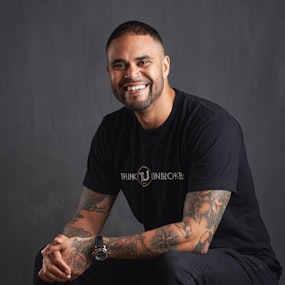
Michael Unbroken
Coach
Michael is an entrepreneur, best-selling author, speaker, coach, and advocate for adult survivors of childhood trauma.

Chelsea London Lloyd
Actress & Grief Gal
Chelsea London Lloyd is a comedian & grief activist who uses humor to help people cope with their pain. Lloyd grew up with two sick parents; at age 8 her parents were diagnosed with ALS and breast cancer. Her dad died of ALS when she was 19 and her mom -- who lost her own mother to leukemia at 19 -- currently combats stage 4 metastatic breast cancer which returned after 17 years in remission.
Lloyd volunteers / hosts peer-lead grief groups via The Dinner Party, mentors a 9 year-old girl (whose mom has stage 4 BC) via Walk With Sally, and volunteers at OUR HOUSE: Grief Support via their grief camps and groups.
She is currently producing viral short-form comedic & grief content for BuzzFeed. @_ChelsWhoElse_
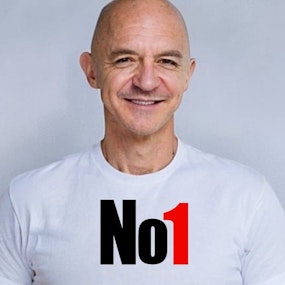
Jake Shannon
Founder
Jake Shannon is one of the pioneers for Catch Wrestling in the USA, his scientific approach to wrestling and martial arts is unprecedented and highly valuable to the martial arts community. Jake received his coaching certification under the famous Billy Robinson, and has been coaching catch as you can wrestlers all the way to high level professional athletes, including; grapplers, mixed martial artists and competitive wrestlers.
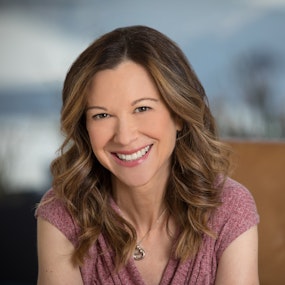
Lori Gottlieb, MFT
Psychotherapist
Lori Gottlieb is a psychotherapist and New York Times bestselling author of Maybe You Should Talk to Someone, which has sold over one million copies and is currently being adapted as a television series. In addition to her clinical practice, she is co-host of the popular “Dear Therapists” podcast produced by Katie Couric and writes The Atlantic’s “Dear Therapist” advice column. She is a sought-after expert in media such as The Today Show, Good Morning America, CBS This Morning, CNN, and NPR’s “Fresh Air” and her 2019 TED Talk was one of the Top 10 Most Watched of the Year. She is the creator of the Maybe You Should Talk To Someone Workbook: A Toolkit for Editing Your Story and Changing Your Life and the Maybe You Should Talk To Someone Journal: 52 Weekly Sessions to Transform Your Life. Learn more at LoriGottlieb.com or by following her on Instagram @lorigottlieb_author and Twitter @LoriGottlieb1.
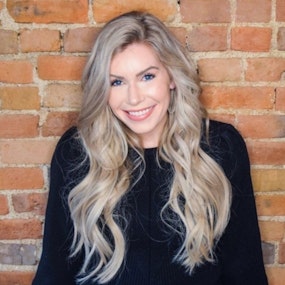
Tamara Fox
Health and Wellness Coach
Tamara is a Health and Wellness Coach who partners with her clients to transform their lives. Tamara became a coach after overcoming her own experiences with trauma, healing, and health challenges.
Tamara takes her own experiences, empathy, education, and resources to empower her clients to be who they want to be... regardless of their past experiences. Tamara knows and has proven it’s possible to overcome anything and find happiness, success, and a fulfilled, empowered life.
Tamara’s experiences with trauma started young. In 2011 at 19 years old, Tamara woke up in the middle of the night in her apartment to a masked man standing over her bed with a gun who robbed her and raped her. Tamara saw her life flash before her eyes (saw memories of her childhood) and thought she was going to die.
Having survived that experience, Tamara struggled with severe anxiety, PTSD and depression and started with traditional western medicine (every prescription available) to help her heal in combination with therapy (talk therapy, EMDR and more). After years of healing Tamara shifted to a more holistic / eastern medicine approach and is grateful that today she's in a place where she can manage her health through a holistic and eastern medicine approach free from prescriptions.
The experience in 2011 wasn't the end of Tamara's experience with trauma. Prior, before and after 2011 Tamara's father was struggling with a severe opioid addiction that turned him into someone no one recognized and made him verbally abusive during black outs...… Read More
Welcome to The Think Unbroken Podcast!
Here are some of my favorite recent guests!



























